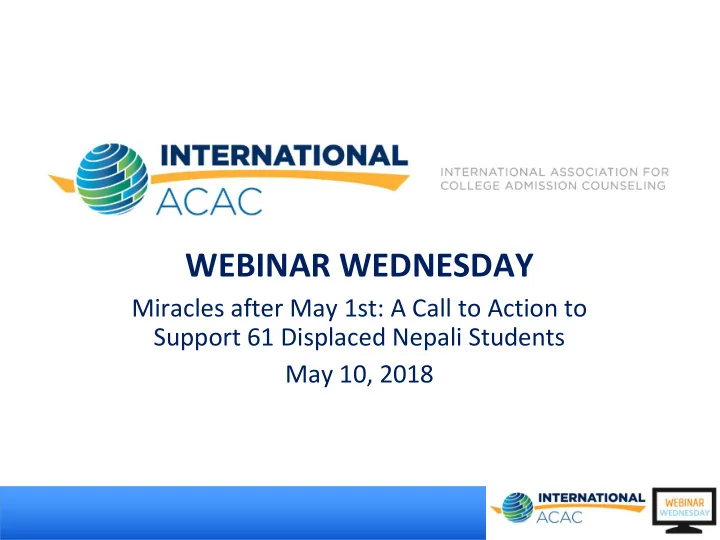

WEBINAR WEDNESDAY Miracles after May 1st: A Call to Action to Support 61 Displaced Nepali Students May 10, 2018
Today’s Panelists Roman Shrestha - r44.jf3@gmail.com High School Student, SOS Hermann Gmeiner School (Nepal) Joan Liu - jli@gapps.uwcsea.edu.sg University Adviser, United World College of South East Asia (Singapore) Kelly Braun - guidance@issh.ac.jp Director of University Counseling, Int’l School of the Sacred Heart (Japan) Brian Bava - bbava@collegeofidaho.edu Vice President of Enrollment, College of Idaho (USA) David Smith - david.smith5@mail.wvu.edu Executive Director and Int’l Student Advocate, Office of Global Affairs, West Virginia University (USA) Karen Scott - k.scott@tcu.edu Director of International Admission, Texas Christian University (USA) Joe Tavares - ias@internationalacac.org Chair of Inclusion, Access, Success Committee, International ACAC High School Counselor, Jakarta Intercultural School (Indonesia)
Polls & Questions Polls • • Please respond to each of the 3 polls when prompted Questions…please ask! • Please type your inquiry into the “Questions” space • on your GoTo dashboard/control panel These questions will be collected and posed to the • panelists at the end of the session
Agenda ● What happened? ● What can you do? ● How to translate concern into action? ● Questions? JT
Background of situation ● On April 13, 2018, a U.S. university informed 61 students in Nepal that their full scholarships (including tuition, room and board, etc) had been revoked. ● In a statement, the university noted that due to administrative oversight, they were no longer able to fulfill the scholarship these students had been granted months earlier. ● Affected Nepali students, families, and schools were devastated. Many of the students had paid a March 1 scholarship confirmation fee, I-20 fees, and housing deposits by the May 1st deadline as they had been asked by the university. ● Students had taken a gap year in order to apply to the US, and had turned down other offers, or had simply stopped applying to more schools, as they already had a full ride. They now had nowhere to go. ● This timing, scale, and impact of this situation is unprecedented, as May 1st marks the end of the admission cycle for most U.S. universities. JL
Who are the 61 students? Roman (young man on the right) marching to raise awareness about polio. JL / RS
What can we do to help? Over the past 3 weeks, the International ACAC community has rallied around the students: ○ High school and independent counselors are mobilizing to provide pro-bono 1-on-1 support to the students ○ High school and independent counselors have identified universities around the world that would admit these students and which would be affordable to the students (for most, $6,000 USD is the maximum amount they can afford) ○ Higher education institutions around the world have extended admission and scholarship opportunities to impacted Nepali students KB / JL
Here’s the website: https://bit.ly/2G4xVR0 KB / JL
Stories of Successful Advocacy BB / KS / DS
If your university is interested in connecting with the impacted Nepali students, please contact: Selena Malla Educational Adviser EducationUSA Advising Center U.S. Educational Foundation in Nepal adviserusef@fulbrightnepal.org.np JL
Broader context ● Currently, International ACAC members and beyond are actively supporting students who aspire to go to university post May 1st. ● It is important that we speak with students in such situations about: ○ gap years ○ community college ○ looking at universities with rolling admission or later deadlines ○ looking at universities globally ● The Nepali students have been great role models for how students must act when the unexpected happens: ○ Students need to be resilient. ○ Students need to be active researchers. ○ Students need to be good communicators. ○ Students need to be self-advocates. ○ Students need to collaborate with each other. JT / JL / RS
Questions?
Today’s Panelists Roman Shrestha - r44.jf3@gmail.com High School Student, SOS Hermann Gmeiner School (Nepal) Joan Liu - jli@gapps.uwcsea.edu.sg University Adviser, United World College of South East Asia (Singapore) Kelly Braun - guidance@issh.ac.jp Director of University Counseling, Int’l School of the Sacred Heart (Japan) Brian Bava - bbava@collegeofidaho.edu Vice President of Enrollment, College of Idaho (USA) David Smith - david.smith5@mail.wvu.edu Executive Director and Int’l Student Advocate, Office of Global Affairs, West Virginia University (USA) Karen Scott - k.scott@tcu.edu Director of International Admission, Texas Christian University (USA) Joe Tavares - ias@internationalacac.org Chair of Inclusion, Access, Success Committee, International ACAC High School Counselor, Jakarta Intercultural School (Indonesia)
Recommend
More recommend